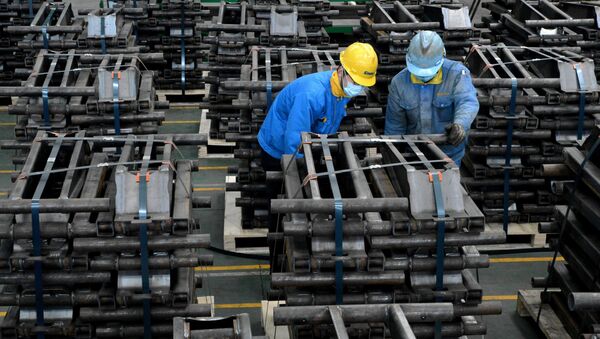“China is basically economically recovering. They took [a] terrible hit in the first quarter of the year - GDP [gross domestic product] down 6.8% - but basically the economy is restarting … The situation in the EU, it’s not yet determined, because like the US, some European countries are making determined efforts to clamp down on the coronavirus,” Ross told hosts Bob Schlehuber and Jamarl Thomas.
“Italy, for example … they had a terrible situation. They’ve made progress. Spain has made some progress. Germany has made some progress. Because you don’t deal with the economic situation until you get the virus under control,” Ross said. However, economists are fretting that the United Kingdom could be looking at the worst recession in centuries.
An April 16 New York Times article titled “China’s Economy Shrinks, Ending a Nearly Half-Century of Growth” noted that the coronavirus outbreak had brought China’s “extraordinary, nearly half-century-long run of growth to an end.” Chinese officials last month announced that the country’s economy shrank by 6.8% during the first three months of 2020 compared to 2019, as most factories and offices across the nation were shut down in January and February in a vigorous attempt to contain the virus. However, since then, China’s factories have resumed production, with the country’s construction and service industries experiencing some improvement.
According to Ross, the impact of the coronavirus in Europe has been varied. Some Eastern European countries, which used their advanced warning about COVID-19 wisely, have been successful at containing the virus, unlike the US, which has been criticized for its late response to the outbreak.
“The situation in Europe is extremely differentiated. Firstly, some Eastern European countries have been extremely successful. For example, the Slovak Republic has less than 1 death per million people. It’s almost at Asian levels. It’s been very, very successful. On the other hand, some countries are obviously disasters, like Italy and Spain. Germany at the present time is in the middle,” Ross said.
“Germany has not been terribly successful at controlling the number of infections … What Germany has been successful in, relatively, is controlling the number of deaths, and this is due to the fact that the German health system is superb. They’ve got four times the number of intensive care unit beds [compared to Britain]. They’ve got more doctors, more nurses … It will be very important to see what happens,” he added.
While more than 90 governments across the world have requested aid from the International Monetary Fund to help their populations during the pandemic, others are forcing people to return to work to avoid starving.
“If you take, for example, China, they ensured people got food. They ensured people got income, and therefore people could lock down. In Britain and other countries, they’ve been forced to go back to work … Given the big economic depression that’s going to come because of this - this is going to be the biggest economic hit since the Great Depression - interest rates are going to be extraordinarily low,” Ross explained.
“A government can borrow money necessary to subsidize the population if it wants to. The problem is, some countries, for example, the US, don’t want to. They want to force people back to work through starvation. They want to kill large numbers of people to get the economy going,” he added.
The US Federal Reserve last Wednesday confirmed that it was holding its key interest rate near zero to “support the US economy in this challenging time.” Data released by the US Bureau of Labor Statistics shows that 20.5 million US jobs were lost in the month of April alone, causing the unemployment rate to skyrocket to 14.7%. In contrast, the US unemployment rate in February was 3.5%. However, with dozens of US states lifting lockdown measures, unemployment is expected to decrease.
“The US is the second-largest manufacturing power in the world, after China. It could have produced millions and millions of testing units, personal protective equipment, ventilators, and it didn’t. The death toll in the US is simply due to the fact that it had two months to prepare, which it completely wasted,” Ross added.
“The balance of economic power is going to shift to the East,” he said. “They are going to recover much more more quickly than Western Europe and the US, so there’s going to be a big shift in economic power towards Asia.”




